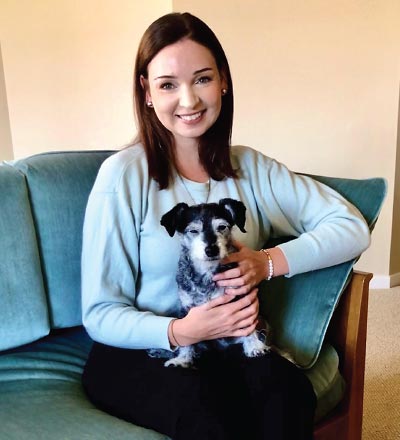Caring for Carers: Veterinarians Struggle With MH Issues
Abstract
Despite a suicide rate more than twice as high as that of the general population, many veterinarians are hesitant to discuss mental health. A new initiative aims to provide them with more resources and encourage them to open up about their experiences.

The Veterinary Mental Health Initiative aims to offer veterinarians a place to speak with a professional as well as their colleagues, an especially important opportunity because so few veterinarians are open about their mental health struggles, says Katie Lawlor, Psy.D.
It is a typically busy afternoon in an animal clinic, and the veterinarian is explaining to a grief-stricken family that their beloved dog has cancer. Treatment is possible, but it is beyond the family’s financial means. They discuss euthanasia. The veterinarian has only a few minutes to process the conversation before stepping into the next examination room to meet a couple and their newly adopted, rambunctious kitten.
“The emotional highs and lows of a veterinarian’s job are intense and demanding,” said Steven Moffic, M.D., a retired tenured professor of psychiatry at the Medical College of Wisconsin in Milwaukee. He has worked with colleagues to lead group sessions during an annual retreat for veterinarians from across the country, encouraging participants to talk about mental health, as well as the impact of burnout. “They probably have one of the most stressful caring jobs that exist,” he continued. “But there has been a real reluctance among veterinarians to consider their own mental health.”
According to a 2019 study that the Centers for Disease Control and Prevention published in the Journal of the American Veterinary Medical Association, female and male veterinarians were 3.5 and 2.5 times as likely to die by suicide, respectively, compared with the general population.
In 2020, in response to the mounting mental health concerns among the veterinary medicine community, psychologist Katie Lawlor, Psy.D., and San Francisco philanthropist Emily Scott founded the Veterinary Mental Health Initiative (VMHI), a nonprofit program that provides free and confidential mental health services to veterinarians and veterinary technicians who need additional support. VMHI began as a pilot program with 17 participants and has since expanded to a permanent program that has served over 250 veterinarians and veterinary technicians. It offers both professionally facilitated support groups and one-on-one sessions with doctorate-level clinicians.
“We get a lot of feedback that the culture among veterinarians is very much about ‘sucking it up,’ ” Lawlor said. “They feel that, with all the emotional ups and downs they go through, if they shared their emotions, there’s no way they could make it through the day.”
Choosing to Care for Animals, Yet Dealing With People

Veterinary medicine is a noble profession, but aspiring veterinarians should consider the full picture of the job before choosing it, says Alett Mekler, D.V.M.
Alett Mekler, D.V.M., a veterinarian in Boston, described the career as a noble profession, but the lack of available mental health resources is troubling. She described the difficulties she had in veterinary school, experiencing depression and an eating disorder, and having thoughts of suicide. “The type of person who goes to veterinary school is, typically, very driven and won’t stop,” she said. “No one spoke about mental health. There was a lack of support and no resources. I’m shocked I got through veterinary school.”
The animals are the veterinarians’ patients, but they also must deal with the owners, whose ideas around treatment may not align with what the veterinarian thinks is best. Lawlor pointed out that veterinarians also often care for the pets of their family and friends, which exacerbates feelings of anxiety, guilt, or failure if the treatment does not go according to plan.
Financial constraints also play a role, as veterinarians must all too often deliver the difficult news that, though treatment may be available, it could be out of the family’s financial means. “I worked on a Stanford inpatient unit, and I would never in a million years have been expected to talk about insurance and health care benefits before offering treatment,” Lawlor said. “Yet that is what veterinarians have to do every day.”
Additionally, there is a common misconception that veterinarians earn high incomes, on par with physicians, Lawlor said. According to the U.S. Bureau of Labor Statistics, the average veterinarian salary ranges from $60,000 to $165,000. Those whose income falls on the lower end of the spectrum can face significant barriers to accessing mental health treatment, Lawlor said.
Creating boundaries is especially difficult for veterinarians, Mekler said. She shared stories about people at parties asking her questions about their pets, and even getting questions from a nurse who was inserting an IV catheter before she underwent surgery. “It’s a lot to deal with, but on the other end is an animal who may be in pain or danger, so it’s not easy to ignore,” she said. “I had a patient who had to go to an emergency clinic the other day, and I woke up in the middle of the night wondering if that animal was alive or not. This isn’t a 9-to-5 job. Veterinarians are thinking about their patients all the time.”
Learning to Set Boundaries
Mekler joined VMHI shortly after it was created, and the group has helped her tremendously, she said. “We know, in theory, how to set up and maintain boundaries, but sometimes we don’t know how to do that in practice,” she said. “It’s incredibly meaningful to feel, as a veterinarian, that you are not alone, because so often you feel as though you’re the only one going through this.”
The fact that VMHI is specifically tailored to veterinarians has helped her feel understood since she first became a participant. “I truly think mental health has been overlooked for a long time in the field,” Mekler said.
Moffic encouraged his fellow psychiatrists to work with veterinarians when possible. “It’s been an emotionally and intellectually rewarding experience to help them,” he said. “It feels so important because they’ve had such little support around mental health, and they’re such caring, compassionate people.” ■
Resources
Information about the Veterinary Mental Health Initiative
“Suicides and Deaths of Undetermined Intent Among Veterinary Professionals From 2003 Through 2014”



